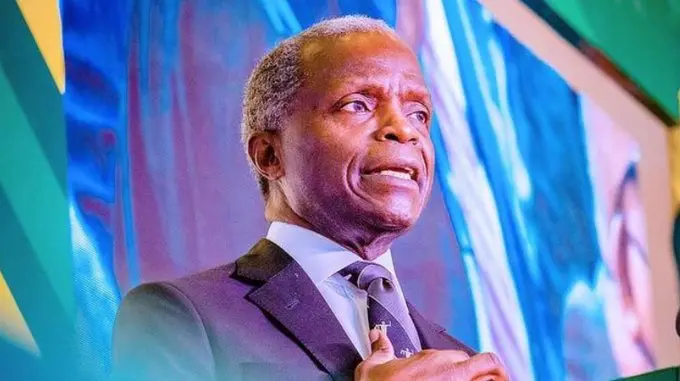Olusegun Ariyo
The former Vice President of Nigeria, Prof. Yemi Osinbajo, has advocated climate-positive growth for job and wealth creation to deal with extreme poverty in Africa.
Climate-positive growth is a way of measuring progress towards a more sustainable future by removing more carbon dioxide from the atmosphere than is emitted. It’s also known as carbon-negative growth.
The memorial lecture was organised by the Nigerian Conservation Foundation (NCF) in collaboration with Chevron.
The lecture, with the theme “Greening Africa’s Economies: Can Climate Positive Growth Deliver Prosperity?”, was delivered by Osinbajo.
He said Africa could help the world meet its net zero target by developing a green partner or climate-positive growth.
“The important thing about this is that it will create jobs and wealth and deal with extreme poverty.
“And I think we should ask ourselves the question, why does the climate-positive growth paradigm for development make sense?
“Why does it make sense for Africa to develop along the green economic paradigm? It is because we have climate competitiveness.
“That is to say that our economies will do better than most other economies if we grow green,” he said.
Osinbajo who said the world was increasingly paying for climate solutions noted that the world was changing its ideas on what to consume or whether it is green.
“The world increasingly pays for climate solutions and what I mean by this is that through consumer preferences, consumers in different parts of the world, of course, are changing their ideas about what they will consume, whether those things are green.
“There’s also a carbon price. In many different economies today, there is a carbon price. In other words, you are emitting carbon, you pay a price for it one way or the other.
“So, the places in the world that can provide green solutions, most cost-competitive, have a massive economic opportunity.
“So if in Africa we can produce any product that is competitive, green products that are competitive, we already have a massive economic advantage.
Osinbajo, who said Africa had the key ingredients to be a major climate action powerhouse, attributed these to untapped renewable energy, a young entrepreneurial workforce, and relevant natural assets and resources,
“Indeed, late starters to industrialisation and our low-carbon footprint can be an advantage to us, enabling us to develop green-filled energy manufacturing.
“This will save us the cost of abandoned legacy carbon-intensive manufacturing projects.
“By pursuing an industrialization pathway using renewable energy, of which we have 60 percent of the world’s potential, we can develop the first green industrial civilisation,” he said.
Osinbajo said Africa could achieve economic growth without growing emissions or even keeping emissions constant.
“This way, we can realize economic growth, job creation, and livelihood improvement by being a part of the climate solution.
“I think it’s been well argued that Africa probably has the best potential in terms of the green and blue assets that we have to become the first truly green industrial civilisation.
“This enables the world to achieve its net-zero objectives. Africa is a global powerhouse of natural and renewable energy resources, and this positions the continent at the heart of the green transition.
“Now, there are some facts from very well-established public resources that show that Africa holds one-sixth of the world’s remaining forests, one-sixth of all of the forests,” he said.
He added that Africa could either be the nexus of the world or the solution to the current crisis.
“We can either be and when I say we, I refer to Africa, we can either be the nexus of the world or the solution to the current crisis, depending on how we choose to develop.
“To achieve this net zero condition, the world needs Africa to take a carbon-negative path to develop,” he said.
The NCF Director General, Dr Joseph Onoja, while speaking with journalists after the lecture, called for a strong governance to ensure full implementation on actions regarding the cilantro growth.
“The S.L. Edu annual lecture provided a platform for us to bring out some conversations on this field and this is an example of that.
“That is why we will continue to push. Apart from the plans that we have, we will need a strong governance structure that we will be able to ensure that whatever actions or activities we want to implement will be implemented.
“If we do not have strong governance, then whatever we are doing will be washed down the drain and that’s why we encourage that there should be transparency, accountability in all that we do,” he said.
Earlier, the National Executive Chairman, NCF, Justice Bukola Adebiyi, thanked Osinbajo for the lecture.
Adebiyi urged Nigerians to continue to plant trees for a greener and better environment.
Two Doctor of Philosophy (PhD) students were awarded grants in their respective fields of study.
The two PhD students are Yohanna Christopher and Oluwatoyin Olayinka both studying Plant Ecology and Forest Information Systems in the University of Jos and Ibadan respectively.







